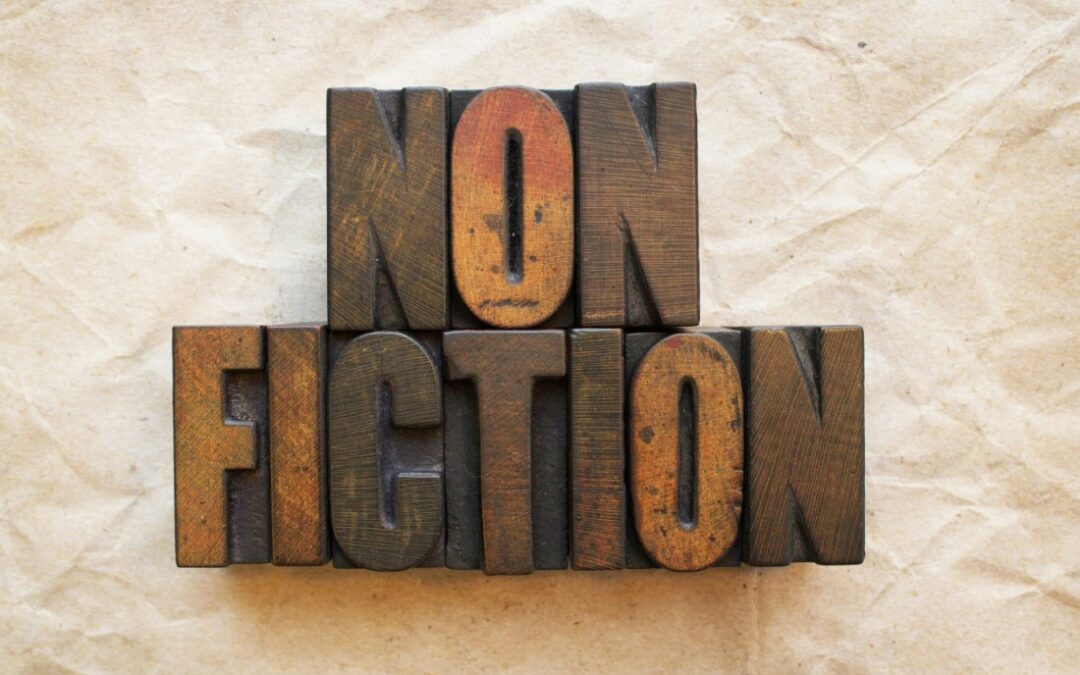Non-fiction writing is a genre that encompasses many styles and formats. It is a type of writing that deals with facts, actual events, and information rather than fiction or imaginary events. Non-fiction writing can be informative, educational, or persuasive and can take the form of a book, an article, a blog post, or a speech. This blog post will explore some of the most common types of nonfiction writing, including biographies and memoirs, History Writing, Travel Writing, Philosophy Writing, Self-Help Writing, and Humor Writing. Each type of writing has its unique purpose and style, and by understanding the different types of nonfiction writing, you can choose the right format and style for your message and audience.
Biographies & Memoirs

A biography is a detailed account of a person’s life, including their childhood, education, career, and major accomplishments. We can write biographies about famous figures such as presidents, actors, or scientists, as well as lesser-known individuals who have made significant contributions to their field. Biographies can be written for various audiences, from academics to the public, and are often used to provide context and understanding of a person’s life and impact.
On the other hand, a memoir is a personal account of a person’s life, typically focusing on specific events or experiences. It is an autobiography written by the person, reflecting on their experiences and perspectives. We can write memoirs about a wide range of topics, from growing up in a particular culture or community, to overcoming a personal challenge, to navigating a specific career or industry. Memoirs are often used to offer insight into the writer’s thoughts, feelings, and motivations and can be both reflective and introspective.
When writing a biography or memoir, it’s important to research thoroughly and approach the subject matter with sensitivity and objectivity. It is also important to consider the audience and what they might be looking to gain from reading the book.
A biography is a detailed account of a person’s life, including their childhood, education, career, and major accomplishments. We can write biographies about famous figures such as presidents, actors, or scientists, as well as lesser-known individuals who have made significant contributions to their field. Biographies can be written for various audiences, from academics to the public, and are often used to provide context and understanding of a person’s life and impact.
On the other hand, a memoir is a personal account of a person’s life, typically focusing on specific events or experiences. It is an autobiography written by the person, reflecting on their experiences and perspectives. We can write memoirs about a wide range of topics, from growing up in a particular culture or community, to overcoming a personal challenge, to navigating a specific career or industry. Memoirs are often used to offer insight into the writer’s thoughts, feelings, and motivations and can be both reflective and introspective.
When writing a biography or memoir, it’s important to research thoroughly and approach the subject matter with sensitivity and objectivity. It is also important to consider the audience and what they might be looking to gain from reading the book.
History Writing
Historical writing is non-fiction writing that explores the past. It can include books, articles, and documentaries that cover specific events, periods, or people in history. Historical writing is often used to provide context and understanding of the past and can also be used to explore the impact of historical events on the present.
Historical writing can take many forms, from academic texts and scholarly articles to popular history books and historical fiction. Academic historical writing typically involves extensive research and analysis of primary sources, such as letters, diaries, and government documents, and is often intended for a scholarly audience. Popular history books, on the other hand, are written for a general audience and often focus on a specific event or period in history, providing a more accessible and engaging account of the past.
Travel Writing
Travel writing is a form of creative nonfiction that describes, informs, and entertains readers about a particular destination or travel experience. It can take many forms, including magazine articles, guidebooks, memoirs, and blog posts. A good travel writer should have a strong sense of place, an eye for detail, and the ability to convey the unique qualities of a destination. They should also be able to tell a story and make the reader feel like they are experiencing the journey themselves. Travel writing can be a challenging and rewarding career for those passionate about exploring new places and cultures.
Humor Writing
Humor writing is a craft that requires a unique combination of wit, creativity, and timing. It is the art of making people laugh using words, whether it be in the form of a stand-up comedy routine, a sitcom, or a comedic article.
Humor writing is not just about telling jokes or puns; it is also about finding the funny in everyday situations and relatable scenarios. A good humor writer can turn a mundane topic into something hilarious by adding a witty perspective or clever observation.
One of the keys to successful humor writing is understanding your audience. A writer must know what their audience finds funny and tailor their writing to appeal to them. This can include using specific pop culture references or understanding the current political climate.
Philosophy Writing
Philosophy writing can take many forms, including academic papers, essays, and books. It is often characterized by its rigorous and systematic approach and use of logical reasoning and critical thinking.
In philosophy writing, an author usually presents a thesis or argument and then uses logical reasoning, evidence, and counter arguments to support or refute it. A good philosophy writer should have a strong understanding of logic and the ability to evaluate and analyze arguments critically. They should also be able to present their ideas clearly and succinctly and anticipate and address counterarguments.
Philosophy writing is often associated with academic writing, but we can also find it in popular and literary forms, such as novels, poetry, and even films. Regardless of its structure, philosophy writing is a powerful tool for exploring the most profound and complex questions of human existence and understanding.
Self-Help Writing
Self-help writing is a genre that aims to empower individuals to improve their lives, relationships, and personal well-being. It can take many forms, including books, articles, blogs, and podcasts. Self-help writing addresses many topics, including personal development, mental health, relationships, career, and spirituality.
Self-help writers use personal anecdotes, practical advice, and research-based information to give readers the tools and knowledge they need to make positive changes. They often adopt a motivational and empowering tone, encouraging readers to take control of their lives and make positive changes.
A good self-help writer should have a deep understanding of the topic they are writing about and the ability to communicate complex ideas in a clear and accessible way. They should also be able to connect with their readers on a personal level and provide practical, actionable advice.
In conclusion, there are many different types of nonfiction writing, each with its unique purpose and style. Whether informative, persuasive, or narrative, nonfiction writing allows us to learn, understand, and engage with the world around us. From memoirs and biographies to self-help books and travel guides, nonfiction writing provides a wealth of knowledge and insights. It is a powerful tool for storytelling and communication and an essential part of our literary landscape. Whether you are a writer, a reader, or both, nonfiction writing offers something for everyone.
